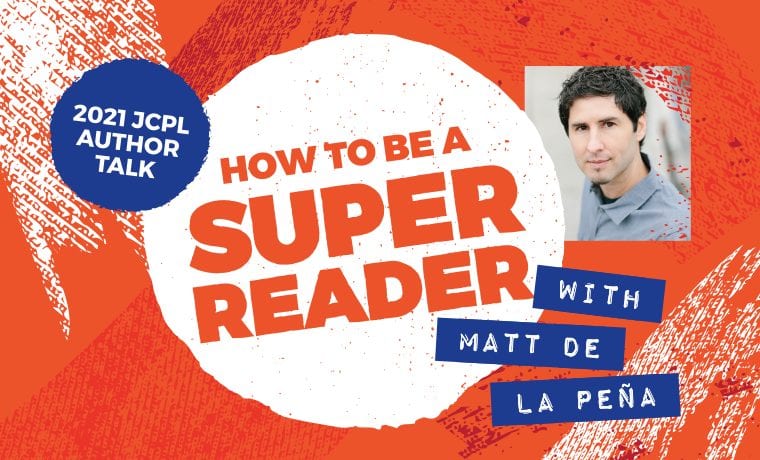 Matt de la Peña is the award-winning author behind young adult and children’s books like Mexican Whiteboy, Milo Imagines the World and Love. His work often focuses on the importance of empathy, featuring resilient characters in everyday circumstances. He cites his working-class background and childhood as his inspiration. A self-described ‘reluctant reader’ in his youth, de la Peña shares his journey to becoming an award-winning author on Tuesday, October 5.
Matt de la Peña is the award-winning author behind young adult and children’s books like Mexican Whiteboy, Milo Imagines the World and Love. His work often focuses on the importance of empathy, featuring resilient characters in everyday circumstances. He cites his working-class background and childhood as his inspiration. A self-described ‘reluctant reader’ in his youth, de la Peña shares his journey to becoming an award-winning author on Tuesday, October 5.
Before the main event, we sat down with de la Peña to chat about the importance of representation, empathy and more to get ready for the event. This interview has been edited for clarity and length.
We appreciate the fact that your books resonate so well with reluctant readers and with such a wide audience. Why do you think that is?
I’m drawn to real life, realistic fiction; people in working class communities. I think that reluctant readers want stories of real life. It also might be the representation element. When I was growing up, if I saw a book that was either mixed-race like me or Mexican – I’m half-Mexican – I felt like it belonged to me. I think that reluctant readers tend to think that my books belong to them.
You’ve moved from writing predominantly for a teen audience to writing kids’ books. What motivated that shift?
I had an agent that asked if I had considered writing a picture book, [and] I hadn't...I wondered if I could approach [writing picture books] the same way as when I was lying on my floor, writing spoken word poems. So I tried to do it, and it felt really good.
How have you seen kids’ minds be opened by your books in your author visits?
There was a boy in Georgia. After I read Love, he was in tears. This was a third-grader in a rough elementary school. He said, “that book made me think of my grandmother, who gave us love without ever saying she loved us.” He was so moved by thinking about his grandmother, and all of his friends were so supportive of him showing his emotions there…This book was a vehicle for him to share this experience and think about his grandmother. But not only that, for the kids around him to join in on that experience.
The name of your event is “How to be a Super Reader,” and aims to inspire a love of reading in kids, not just because they need to read. What do you think caregivers, parents and teachers can do to develop Super Readers?
I’ve watched my daughter go from just reading flashcards and [learning] to sound the words out, to reading graphic novels over the pandemic. At first, she would just look at the pictures of the Dog-Man graphic novels, and I would read it to her at night. I watched her start to read the dialog bubbles, and she would laugh at them. Then, she transitioned to reading everything. Now, she’s about to be in second grade, and she’s read every book that Rick Riordan has ever written! I never tried to steer her to any particular type of book – I just wanted her to have access to all the stories and whatever she’s drawn to.
What role have libraries played in your life?
There’s one memory I have that was my awakening moment for libraries. I wasn’t a reader; I was a basketball player. I wasn’t really a student; I was a basketball player. That was my identity. So I would go [to the library] every day and read this magazine called Basketball Digest. I would hide the magazine in the most important book I could find. It was usually War & Peace. [But the librarian] knew what I was doing. Every time there was a new issue of Basketball Digest, she would slide it across the table to me. She [respected] what I was reading. I started reading books that she recommended because I respected and trusted her.
Any final advice on how to turn reluctant readers into super readers?
Reluctant readers are the best readers. If they can find an entry point into a book, they are going to come out of it being drawn to the bits of the human experience. If we can allow kids to wander into [reading] on their own, that’s how you make a super reader. It’s not us making them be a super reader, but allowing them the space to make themselves a super reader.
